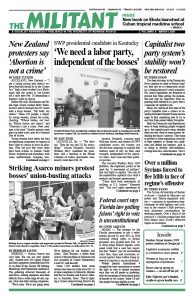Media worldwide headlined the news Feb. 24 with reports that coronavirus infections and deaths were spreading outside China, where it originated, with spikes in South Korea, Japan, Iran and northern Italy. Capitalist governments around the world either admit their health systems are ill-prepared for a sizable outbreak, or they’re lying.
Medical systems like in the U.S., Europe and those imposed by the workings of imperialism in most of the semicolonial world are run for profit, not human needs. They increase the deadly risks — and danger to humanity — from this highly contagious disease. Because COVID-19 is a new virus to humans, no one is immune. Except for very rich people, hospital quarantine facilities would rapidly become overwhelmed, and ventilators and oxygen essential for those with the severe pneumonia this coronavirus can cause would rapidly run short.
The discovery that the incubation period may be up to double the 14-day quarantine being applied around the world has heightened concerns about the spread of the virus and the actual number of people that are infected and become carriers. It has a fatality rate 40 times that of the seasonal strains of flu. Even in the case of the flu today, the inadequate for-profit hospital system in the U.S., let alone in less developed countries, is overwhelmed. As of Feb. 24, at least 29 million people in the U.S. have caught the flu and so far some 16,000 have died.
The capitalist financial press is more and more concerned about a contraction in the world economy, a crisis that is exacerbated by so-called globalization. This has made production in the U.S. and other imperialist countries completely dependent on parts and other components produced thousands of miles away in countries where workers get lower wages. Facing the unfolding spread of coronavirus, world stock markets plunged Feb. 24-26.
The central government in Beijing is trying to restart export-oriented factories to overcome the interruption to China’s already slowed economic growth. But more than one-third of China’s 775 million-strong labor force are rural migrant workers, many facing a 14-day isolation period on their return from holiday or lockdown. Many are in limbo.
Capitalist pundits have lurched from complacency to fear not only about a pandemic but also about the economic shutdown in China. Container shipping in and out of the country has slumped. Demand for oil is the lowest since the global financial crisis over a decade ago.
As oil prices plunged, the S&P 500 index in New York lost $2.138 trillion in market capitalization in four days. Wealthy investors rushed to safe havens in the U.S. dollar, treasury bonds and gold.
Capitalist traders will invest in anything to try and make a profit. In 2017, on the heels of the Ebola epidemic, the World Bank issued a special $320 billion catastrophe bond to raise money in case of a pandemic. The bond is based on a series of “event triggers” related to the number of deaths in the country of the disease’s origin and its neighbors.
Investors, smelling money, piled in. But “nobody expected coronavirus to come along,” the Financial Times reported. Now it looks like the bond will go bust.
Clusters of outbreaks
Officials from the World Health Organization sounded a warning Feb. 21 about the rapid spread in disease clusters in the South Korean city of Daegu and the Iranian city of Qom. Authorities in Tehran, like Chinese authorities before them, tried to hide the extent of the outbreak, denying reports that 50 people had died in Qom. On Feb. 24 they finally had to admit the reports were true.
Iraj Harirchi, Iran’s deputy health minister, downplayed the outbreak, saying “quarantines belong to the Stone Age.” He has since contracted the disease. New cases have spread from Iran to Lebanon and Canada. Neighboring countries from Iraq to Turkey as well as Dubai Airport have suspended flights to Iran.
The largest concentration of the outbreak has been among almost 4,000 passengers and crew confined to a cruise ship docked at Yokohama, Japan. Crowded together in close quarters on a vessel with no medical protection, more than 600 people have been infected so far and two have died.
WHO leaders are especially concerned about the virus spreading into African countries with growing links to China. Their health systems are notoriously stunted.
This unpredictable epidemic is part of the deepening social disaster that capitalism in crisis is imposing as a mounting toll on working people.
The Cuban internationalist mission in West Africa in 2014-2015 — Fidel Castro’s “army of white coats” — that helped stem the Ebola virus spreading there points to what could be done by marshaling the voluntary efforts, self-discipline and creativity of millions to halt the march of this new disease. This example is brought to life in Pathfinder’s new book, Red Zone: Cuba and the Battle Against Ebola in West Africa (see article in this issue).
Disease started in China
By Feb. 26, over 80,000 definite cases were reported with almost 3,000 deaths, most of them in China. The Chinese rulers made the situation worse by trying to cover up the disease’s spread until it became impossible to do so. There have now been more than 1,500 instances of infection in 36 other countries, mainly from people who traveled to China. WHO spokespeople say this could be just “the tip of the iceberg.”
Factories across China are still closed or short-staffed, dislocating world supply chains.
Plants are closed across Hubei, where the outbreak was first reported. They are vital for global production from cars to aerospace, from medical to electronic products. Apple’s largest factory with 200,000 workers run by Foxconn in Zhengzhou, Henan, was still stalled Feb. 21. Disruptions to just-in-time supply lines have forced Hyundai and Kia to halt production in South Korea. Automakers from Japan to Germany, France and even the U.S. are affected.
The lean inventories of major companies like Amazon, Apple and Nike avoid money being tied up in warehouse stockpiles awaiting sales. But this crisis has showed how vulnerable these just-in-time “globalized” supply lines are.
Decoupling of many U.S. firms from Chinese suppliers started with uncertainties about the Washington-Beijing tariff and trade dispute. Now this process of deglobalization will be hastened by the fallout from the virus.
Airlines under mounting pressure
The fall in daily domestic and international flights from China from over 15,000 to just over 2,000 due to quarantine restrictions has put Chinese airlines and Asia-Pacific carriers under mounting pressure. The massive falloff of Chinese travelers, who account for about a fifth of all tourism spending worldwide, is having an impact across the board.
Outbreaks were reported at several jails in China Feb. 21, including in two Chinese provinces outside Hubei. Some 230 cases were diagnosed at Wuhan Women’s Prison alone. Two hospitals in Beijing have reported an outbreak with about 400 cases sparking fears of an epidemic in the capital of 22 million people.
Some 1,200 people in the Uighur Autonomous Region of Xinjiang are suspected to have contracted the virus. An estimated 1 million Uighurs detained in “reeducation” camps are at risk. The contagion is especially virulent among clusters of human beings in close proximity to each other.
The regime’s brutality repressing the largely Muslim Uighurs is well-known around the world even though Beijing claims the camps are just to help them get jobs. When Wang Xining, a Chinese diplomat posted in Australia, went on ABC TV there Feb. 24 and repeated this claim, the audience laughed at him.


